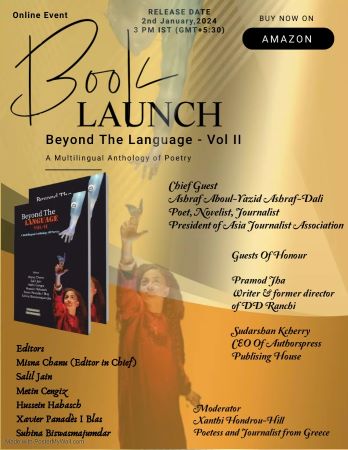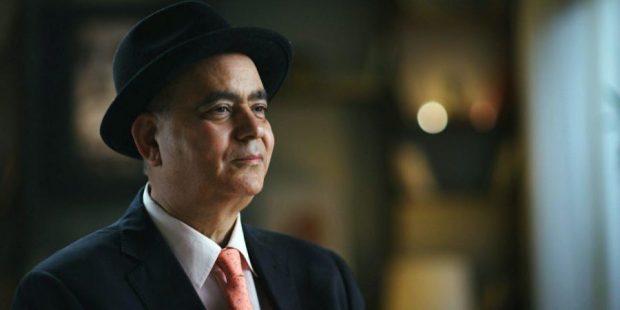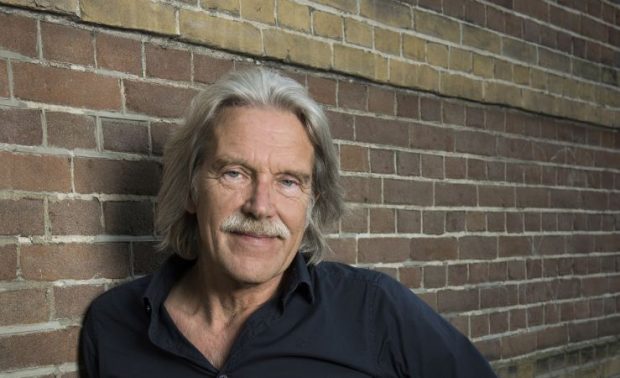
Beyond the language: A multilingual poetry anthology to be launched

By Ashraf Aboul-Yazid
President, Asia Journalists Association
CAIRO: Today, January 2, 2024, at 7:30 PM, Cairo time, I will be joining an online event, as a chief guest, to launch the multilingual anthology book of poetry entitled (Beyond the Language – Vol II).
Poetess Misna Chanu (Editor in Chief), along with other editors for different languages; Salil Jain, Metin Cengiz, Hussein Habasch, Xavier Panades I Blas, and Subina Biswasmajumdar will join the event moderated by Greek-German poetess, journalist and translator Xanthi Hondrou-Hill.
The main aim of publishing this kind of book is to convey the message to the world that beyond the differences of languages or any other differences, we are one human family.
On October 2, 2021, Volume One this Multilingual Anthology of Poetry “Beyond The language” of seven international Languages; Manipuri, Greek, Italian, German, Spanish, Filipino and Polish with English translation of all the six languages was launched.
After almost two years, the second edition of the book is published by the same publishing house. But this time the book is published with six languages including Manipuri, the mother tongue of Misna Chanu, the compiler and editor in chief of the book.
The languages included in the second volume are Manipuri, (Meiteilon), Turkish, Kurdish, Hindi, Catalan and Bengali.

As in the first edition, this time as well, the book has been published with English translation of all the languages included so that the readers of all over the world can read and understand. Total 93 poets including the editors have participated in the second volume.
The editors introduced their languages and the book with short words.
On Manipuri, Misna Chanu writes: It is one of the Seven Northeastern States of India. Manipuri also known as Meiteilon or Meeteilon is the official language and is the widely spoken language of Manipur. Besides Manipur, it’s also widely spoken in other states of Northeast India next to Bengali and Assamese. Manipuri is one of the languages included in the Eighth Schedule of the Indian Constitution. It’s a Sino-Tibetan language belonging to the Tibeto-Burman linguistic sub branch.
Other than India, Manipuri language (Meiteilon) is also spoken by the Manipuri people (Meitei) living in Bangladesh and Myanmar (Burma). There are around 1.5 million of Manipuri speakers in India. Manipuri has a long history and a rich literary tradition. In the Manipuri section of this book, I have the honor and pleasure to compile some of the poems from distinguished Manipuri poets along with other five languages of the world to make this garland of Literature that hopefully, will perfume the world with the aroma of Unity, Universal Love, Brotherhood and sisterhood.
Metin Cengiz (Editor of the Turkish Section) writes that Turkish poetry has a centuries-long tradition. The Palace poetry in the Ottoman period (Divan poetry written in Aruz meter / mystical poetry) and folk poetry tradition have continued for centuries. Today’s Turkish poetry is the poetry of a language and linguistic consciousness rising above this huge tradition.
The living Turkish and Turkish Cypriot Poetry that I sent you is the last example of such a developed poem for now. It is very pleasing for me and for our poetry that Turkish poetry is included in such a valuable world poetry anthology. We would like to thank the publishing house and its editors for giving us this opportunity.

On Catalan section, we read the Editor of the Catalan Section’s introduction by Xavier Panadès I Blas on language of the Catalonian Lands (Countries), a cultural- linguistic area encompassed within Italy, France, and Spanish States.
The Romanic language of about 10,000 million speakers is characterized by a high degree of linguistic vitality and variety, and socio-economic and political dynamism. Here, the richness of the language and culture of the Catalonia Lands is reflected in a collection of quality poems from established and emergent poets.
Hussein Hababsch (Editor of the Kurdish Section), writes that the Kurdish language belongs to the Indo-European language family and is spoken by more than fifty million Kurds in Kurdistan and in the diaspora.
The Kurdish language has three main dialects: Kurmanji, Sorani and Zazaki, and many sub-dialects. Most of the texts and poems are written in the Kurmanji and Sorani dialects. Most of the Kurdish literature was written in abnormal conditions, in the absence of freedom and stability, in exile, in prisons and in non-recognition and often in secret.
But despite all these anomalies that tried to obliterate the identity of the Kurdish language and literature, it stubbornly made its way and produced literary masterpieces in various types of literature. Kurdish poetry has very deep roots in history, and it deals with various aspects of life and the topics related to it.
Kurdish poets wrote about mysticism, meditation, philosophy, nature, the universe, the Creator, people, existence, death, love and adoration. But now they write more about the tragedy of the Kurdish people, about occupied Kurdistan, about the resistance, about the great Kurdish women who fight the enemies and the forces of darkness with unparalleled heroism.
This does not mean that all topics are confined to this field, but there are countless other fields they write about. Poetry is the food of the Kurds in their presence and absence, in their stay and travel.

On Hindi, we read the words of Salil Jain (Editor of the Hindi Section) on the proposal “Beyond the Language Vol-II” which is an International Multilingual Anthology of Poetry, came from Misna Chanu who is the compiler and editor-in -chief of this mega project. After the great success of the first volume of “Beyond the Language” for seven international languages, this is the second volume which contains six different languages of the world (Manipuri, Kurdish, Hindi, Catalan, Turkish and Bengali) with English translation of all.
Bengali, one of the book’s languages is the language spoken by the people of eastern region of India, Tripura and Bangladesh derived from Abahatta, Prakrit, a broken from of Sanskrit, is one of the cousins of Assamese Magadhi Maithili and Odia. Several works of the Buddhist monks, written in the 10th and 11th centuries raised Bengali to the status of a written language. We admit that “Charyyacharyya Vinichchaya” is the earliest specimen of Bengali literature.
Though Bengali literature had followed its own glorious journey, from Vishnv padabal, Mangal Kabyo Bengali literature stepped into its adulthood with the assistance of the Christian missionaries and their printing technology. There were lots of intellectuals, common people irrespective of their religion, class, social strata or financial status contribute to the formation of today’s modern Bengali language and literature.
After Rabindranath Tagore, the Nobel laureate from a British colony Bengali literature had crossed a different milestone. At present Bengali acquires the 7th position. From all over the world Bengali speakers pour their excellence to enrich the language and the hidden treasure of its literature.
In the Bengali section of this book, we present poems of some of the distinguished Bengali poets and some rising stars in the field of Bengali literature.
In his foreword Mr. Job Degenaar (Dutch poet and president of PEN Emergency Fund) writes on the importance of language, and how a powerful weapon is the art of writing:
“In his play Cardinal Richelieu, the English author Edward Bulwer Lytton (1803 -1873) wrote the famous quote: ‘The pen is mightier than the sword’. In communication among people, especially in troubled times, the art of writing plays an important role.
When the Chinese sage Confucius (551 – 479 BC) was asked: ‘What would you do if you were called to rule a country?’, he replied: ‘Purify the language!’ To the quite surprised audience he clarified his statement: ‘When the language is not pure, then what is said is not the same as what is meant. In that case, the things that need to be done remain undone. The result is that morals and the arts are deteriorating, justice disappears and people find themselves in hopeless confusion. It is a thing of main interest.’”

Job Degenaar said that poetry is one of the beautiful tools of language; “A poem is a valuable thing, but it is also fragile. And, as the Dutch poet Lucebert (1924-1994) said, ‘Every valuable thing is defenceless.’ You can destroy a poem by deleting non-omittable words or adding the wrong words.
In my opinion reading poetry fits in a wonderful way into our lives, when we are too busy to take time for our language. You can read an average length of a poem within a few minutes, but you will receive a lot of information!”
Under a headline “The Lonely Road of the Poet”, he noted that in many, especially Western cultures, people are less interested in poetry than in many other forms of expression.
A very famous poem, The Road Not Taken, written by the American writer Robert Frost (1864 -1963), tells about a dilemma when choosing a road in a yellow wood. There are two paths, one is passable and grassy, the other one is ‘less traveled by’. The poem ends with these lines: I shall be telling this with a sigh/ Somewhere ages and ages hence:/ Two roads diverged in a wood, and I – / I took the one less traveled by, / And that has made all the difference. I think that poets always choose less passable roads.
He added that poetry, as we know, contains not just meaning, but also it has sound, rhythm, metaphors, expressions and form. All these elements play an obvious role in the communication between writer and reader.
Together, these aspects form a higher unity, similar to lovers who merge into one another. Fine poetry goes wild and, in the best case scenario, so does the reader or listener. It could be the task of a poet to heal the language and use it in a pure way. The result of this, the final version of a poem, is unique: in fact, translating is creating another poem in another language.
He concluded that “Beyond the Language Vol-i”, there were writers from seven main languages of the world, translated into English. Now we have a follow up that combines five additional languages and the mother tongue of the compiler, Mrs. Chanu, as well as translations into English.
Collecting, selecting, translating and publishing poetry is a great enterprise. When reading the poems in this multilingual anthology, you will see that there are many more similarities between cultures than differences. In that way poetry is a bridge between all cultures.
There are overwhelming poems in it, personal evocations, poems about natural beauty, humanitarian verses, fine melancholic verses and engaged messages in a search for a better world. Together, they form a multi-coloured array of talents, similar to the variety of bird calls that you can hear on a walk through a summer forest in the early morning or evening.
Our world is full of problems, and sometimes we need to know the values at all times. One of these values is poetry. Dear Reader, enjoy the poems in front of you and you will realize that the artists behind the poems have lots in common with you.
In the end it is the language in which we can find each other. Mrs. Chanu, her editors and all the poets who have contributed to this volume have, in a wonderful way, succeeded in the challenge of reaching this uniting goal.
I believe that this evening I would suggest having Arabic added for the next version of Beyond the Language.
Arabic, which first emerged in the northwest of the Arabian Peninsula, is a member of the Semitic family of languages. Whilst very early manifestations of Arabic date back as far as the 8th century BCE, the language has been defined and refined over a considerable period of time.
The 10th century in particular saw intense interest amongst Arabic linguists. Arabic language had a major role in the various exchanges on the Silk Roads, especially regarding the interactions between scholars of the Muslim world.

From the 8th century onwards, as Baghdad was one of the main center for sciences and astronomy, Arabic became the main language of study in the fields of science. Therefore, since Arabic language was at the heart of the scientific and cultural exchanges, these various interactions and cooperation in diverse domains contributed to its diffusion along the Silk Roads, and thus to its enhancement.
Approximately 420 million people speak Arabic, according to World Atlas, making it the fifth most-spoken language in the world. It is the official language of 28 countries and one of the six official languages of the United Nations. Arab poets have been the leading personalities to promote the language and its ethics across the ages.
Job Degenaar has a beautiful poem on the ART OF WRITING POETRY, translated into English by Willem Groenewegen:
“I believe in the dandelion plume
which is quite a strain to catch
and that in one sigh you can blow away
as soon as you’re bored
That leaves one so much room
it almost isn’t there when it is
but that with delicate barbs
still binds the earth to itself.”
We, all, share Job Degenaar’s poem with love, trying to catch poetry in all aspects of life around us, no matter the language is, but its human face.


